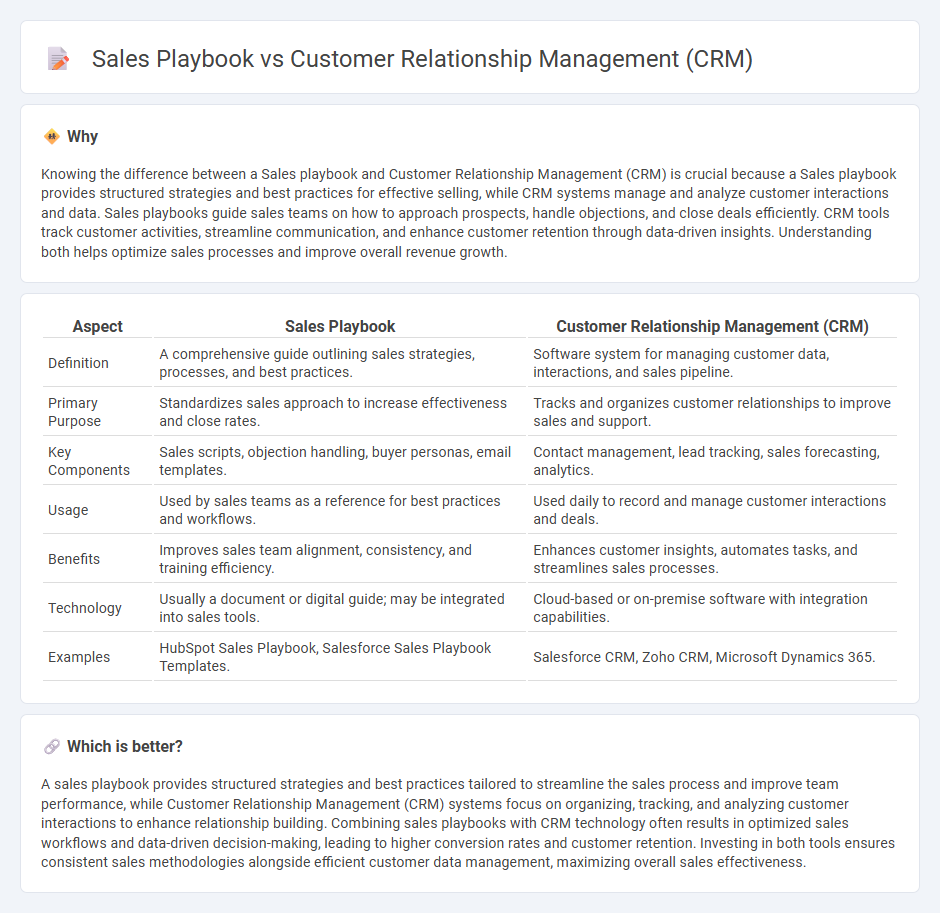
Sales playbooks provide structured strategies and standardized processes to guide sales teams in engaging prospects effectively, while Customer Relationship Management (CRM) systems focus on organizing customer data, tracking interactions, and managing sales pipelines. Integrating a sales playbook with a robust CRM platform enhances sales performance by combining tactical guidance with real-time analytics and customer insights. Explore how leveraging both tools can transform your sales operations and drive revenue growth.
Why it is important
Knowing the difference between a Sales playbook and Customer Relationship Management (CRM) is crucial because a Sales playbook provides structured strategies and best practices for effective selling, while CRM systems manage and analyze customer interactions and data. Sales playbooks guide sales teams on how to approach prospects, handle objections, and close deals efficiently. CRM tools track customer activities, streamline communication, and enhance customer retention through data-driven insights. Understanding both helps optimize sales processes and improve overall revenue growth.
Comparison Table
| Aspect | Sales Playbook | Customer Relationship Management (CRM) |
|---|---|---|
| Definition | A comprehensive guide outlining sales strategies, processes, and best practices. | Software system for managing customer data, interactions, and sales pipeline. |
| Primary Purpose | Standardizes sales approach to increase effectiveness and close rates. | Tracks and organizes customer relationships to improve sales and support. |
| Key Components | Sales scripts, objection handling, buyer personas, email templates. | Contact management, lead tracking, sales forecasting, analytics. |
| Usage | Used by sales teams as a reference for best practices and workflows. | Used daily to record and manage customer interactions and deals. |
| Benefits | Improves sales team alignment, consistency, and training efficiency. | Enhances customer insights, automates tasks, and streamlines sales processes. |
| Technology | Usually a document or digital guide; may be integrated into sales tools. | Cloud-based or on-premise software with integration capabilities. |
| Examples | HubSpot Sales Playbook, Salesforce Sales Playbook Templates. | Salesforce CRM, Zoho CRM, Microsoft Dynamics 365. |
Which is better?
A sales playbook provides structured strategies and best practices tailored to streamline the sales process and improve team performance, while Customer Relationship Management (CRM) systems focus on organizing, tracking, and analyzing customer interactions to enhance relationship building. Combining sales playbooks with CRM technology often results in optimized sales workflows and data-driven decision-making, leading to higher conversion rates and customer retention. Investing in both tools ensures consistent sales methodologies alongside efficient customer data management, maximizing overall sales effectiveness.
Connection
Sales playbooks provide structured strategies and best practices that guide sales teams in engaging prospects, while Customer Relationship Management (CRM) systems track and analyze customer interactions and data. Integrating a sales playbook with CRM ensures consistent messaging, streamlined workflows, and data-driven decision-making throughout the sales process. This connection enhances customer retention, improves lead conversion rates, and boosts overall sales effectiveness.
Key Terms
Customer relationship management (CRM):
Customer relationship management (CRM) systems centralize customer data, streamline communication, and enhance sales pipeline visibility, leading to improved customer retention and increased revenue. Advanced CRM platforms integrate artificial intelligence for predictive analytics and personalized marketing strategies, driving targeted customer engagement. Explore how CRM solutions can transform your sales processes and elevate customer satisfaction.
Contact Management
Customer relationship management (CRM) systems centralize contact management by storing, organizing, and tracking detailed customer information for improved communication and personalized interactions. Sales playbooks complement CRM by providing structured strategies and best practices to engage contacts effectively throughout the sales process. Explore how integrating CRM with a sales playbook can enhance contact management and drive sales success.
Lead Tracking
Customer Relationship Management (CRM) systems centralize lead tracking by organizing contact information, monitoring communication history, and analyzing lead behavior to enhance conversion rates. In contrast, a Sales Playbook offers structured strategies and best practices for sales teams to engage leads effectively and consistently throughout the sales cycle. Explore comprehensive insights to optimize lead tracking and improve sales outcomes.
Source and External Links
What is CRM (Customer Relationship Management)? - CRM is a blend of strategies, technologies, and practices used by companies to manage, analyze, and optimize interactions with customers throughout the customer lifecycle, aiming to improve service, support retention, and grow sales by centralizing customer data from various channels.
customer relationship management (CRM) - CRM is a set of integrated technologies that help organizations track and manage their relationships and interactions with both current and potential customers, supporting sales pipelines, lead management, and overall enterprise resource planning.
What is CRM (customer relationship management)? Full guide - CRM is a centralized tool that enables sales teams to track leads, manage deals, forecast sales, and maintain strong customer relationships by automating workflows and consolidating customer interaction data across multiple channels.
 dowidth.com
dowidth.com